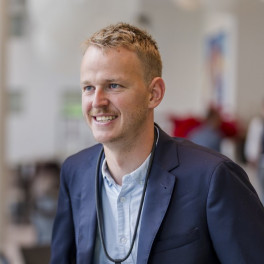Our views
New wealth
Companies and governments should also identify the social and natural impact of their activities. Moreover, as a government, ensure monitoring and enforcement of these non-financial reporting obligations. In addition, policies should measure and steer towards increasing positive social impact. Consider a broad welfare test for new laws and regulations. To examining policies and subsidies with a negative impact. And to encouraging sustainable financing. The government's own operations are also important, including through sustainable procurement and inclusive employment.

True price
An adjustment of the tax system is the most important tool to make sustainable business the standard and make the polluter pay. This can be done by shifting the burden from labour to raw materials and pollution. Lower VAT on sustainable products and higher on harmful products also encourages sustainable entrepreneurs.
We are also committed to further expanding pollution pricing. This works well, as we see with the CO2 price. MVO Netherlands wants to extend this CO2 price to other sectors. And is in favour of levies on other forms of pollution, such as nitrogen and flying.

Supply chains
Doing business within the boundaries of nature and society should be the norm in international chains. The government sets the standard and encourages innovation and sustainability in the chain. This makes legislation at national and European level for international corporate social responsibility (IMVO) necessary. Only in this way can we tackle abuses in the chain and set a minimum standard.
Furthermore, we are committed to encouraging companies that make their supply chain far more sustainable or set up new, responsible chains. The government sets a good example by purchasing responsibly itself.

Inclusivity
Make inclusive business the standard: companies should be representative of society. The women's quota shows that it works to set standards as a government. As far as we are concerned, we can set those standards wider than just for top jobs.

Green energy
In order to have a fully sustainable energy supply by 2050, we need to shake up the system. We need to start doing that now. Firstly, that means that the government must remove the preconditions that keep fossil energy supplies going. Think tax exemptions and compensation for large energy consumers. Also, polluting fuels like diesel and paraffin should be taxed (higher).
On the other hand, the government needs to invest now in technologies that will enable a transition from fossil to renewable energy. Instead of short-term solutions, we expect a clear vision of the future and choices for structural sustainable solutions.

Biodiversity
It is essential to set clear boundary conditions for companies to restore and strengthen biodiversity in the Netherlands and abroad. By setting a limit or price for the emission of nature-damaging substances such as nitrogen and methane, and the use of pesticides. But also by requiring companies to report the impact of their business activities on nature.
We are also committed to a government that promotes nature-inclusive solutions. Think of biobased raw materials for construction, in textiles and chemicals as a basis for plastics, for example. Encourage farmers to switch to natural agriculture. And set a good example with the land the government manages. In tenders, the government can make biodiversity an explicit part of procurement, for example in construction and infrastructure projects.

Circular economy
A system change is needed that makes circular business easier and more attractive than linear business. It is time for a shift to designing products that are sustainable 'by design'. That means that the life cycle is as long as possible and products are easy to repair. By making policies that set minimum product requirements. And by making circular products more affordable than products with 'virgin' raw materials. Subsidies are still needed, but particularly to encourage investment in scaling up effective circular solutions.

Contact

Mark van Luijn
Advisor public affairs

Pieter Lossie
Advisor public affairs